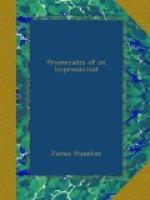His landscapes are real, though without the subtle poetry of Corot or the blazing lyricism of Monet. He hails directly from the Dutch: Van der Near, in his night pieces. Yet no Dutchman ever painted so uncompromisingly, so close to the border line that divides the rigid definitions of old-fashioned photography—the “new” photography hugs closely the mellow mezzotint—and the vision of the painter. An eye—nothing more, is Cezanne. He refuses to see in nature either a symbol or a sermon. Withal his landscapes are poignant in their reality. They are like the grill age one notes in ancient French country houses—little caseate cut in the windows through which you may see in vivid outline a little section of the landscape. Cezanne marvellously renders certain surfaces, china, fruit, tapestry.
Slowly grew his fame as a sober, sincere, unaffected workman of art. Disciples rallied around him. He accepted changing fortunes with his accustomed equanimity. Maurice Denis painted for the Champ de Mars Salon of 1901 a picture entitled Homage a Cezanne, after the well-known hommages of Fantin-Latour. This homage had its uses. The disciples became a swelling, noisy chorus, and in 1904 the Cezanne room was thronged by overheated enthusiasts who would have offered violence to the first critical dissident. The older men, the followers of Monet, Manet, Degas, and Whistler, talked as if the end of the world had arrived. Art is a serious affair in Paris. However, after Cezanne appeared the paintings of that half-crazy, unlucky genius, Vincent van Gogh, and of the gifted, brutal Gauguin. And in the face of such offerings Cezanne may yet, by reason of his moderation, achieve the unhappy fate of becoming a classic. He is certainly as far removed from Van Gogh and Gauguin on the one side as he is from Manet and Courbet on the other. Huysmans does not hesitate to assert that Cezanne contributed more to accelerate the impressionist movement than Manet. Paul Cezanne died in Aix, in Provence, October 23, 1906.
Emile Bernard, an admirer, a quasi-pupil of Cezanne’s and a painter of established reputation, discoursed at length in the Mercure de France upon the methods and the man. His anecdotes are interesting. Without the genius of Flaubert, Cezanne had something of the great novelist’s abhorrence of life—fear would be a better word. He voluntarily left Paris to immure himself in his native town of Aix, there to work out in peace long-planned projects, which would, he believed, revolutionise the technique of painting. Whether for good or evil, his influence on the younger men in Paris has been powerful, though it is now on the wane. How far they have gone astray in imitating him is the most significant thing related by Emile Bernard, a friend of Paul Gauguin and a member of his Pont-Aven school.




